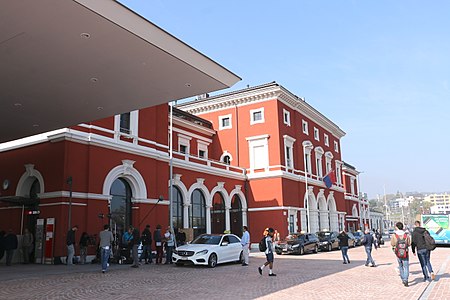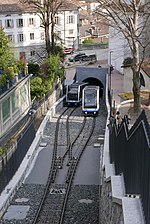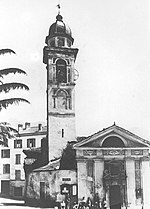Lugano railway station

Lugano railway station (Italian: Stazione di Lugano) is the main railway station of the city of Lugano, in the Swiss canton of Ticino. The station is on the Gotthard railway and is also the terminus of the Lugano Città–Stazione funicular. The metre gauge Lugano–Ponte Tresa Railway (FLP) has a separate station at Lugano FLP railway station across the station forecourt from the main line station.The station is situated on a hillside to the west of the city centre, overlooking the city and Lake Lugano, and the funicular provides a direct link from the station to the city centre below. The residential quarter of Besso lies above and to the west of the station. The station is nicknamed Terrazza del Ticino ("Terrace of Ticino") since the opening of the Gotthard Base Tunnel in 2016.
Excerpt from the Wikipedia article Lugano railway station (License: CC BY-SA 3.0, Authors, Images).Lugano railway station
Piazzale della Stazione, Circolo di Lugano ovest
Geographical coordinates (GPS) Address External links Nearby Places Show on map
Geographical coordinates (GPS)
| Latitude | Longitude |
|---|---|
| N 46.0055 ° | E 8.9468888888889 ° |
Address
Lugano
Piazzale della Stazione
6901 Circolo di Lugano ovest, Molino Nuovo
Ticino, Switzerland
Open on Google Maps







